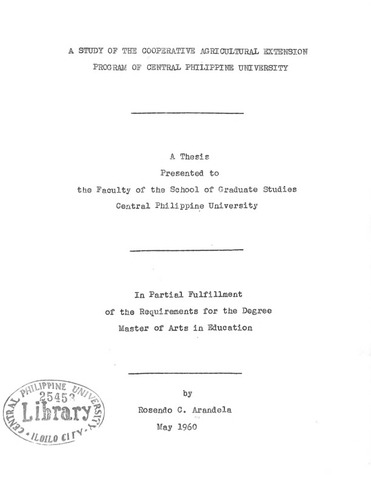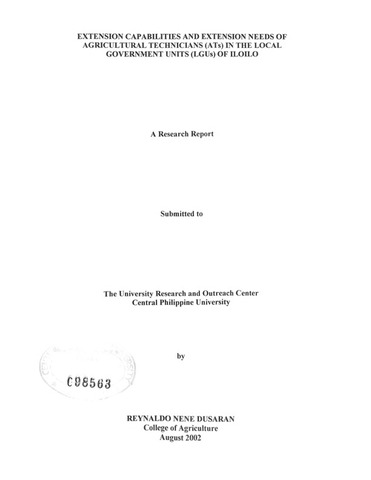A study of the cooperative agricultural extension program of Central Philippine University
| dc.contributor.adviser | Chambers, Elizabeth | |
| dc.contributor.author | Arandela, Rosendo O. | |
| dc.date.accessioned | 2021-12-03T06:15:27Z | |
| dc.date.available | 2021-12-03T06:15:27Z | |
| dc.date.issued | 1960 | |
| dc.identifier.citation | Arandela, R. O. (1960). A study of the cooperative agricultural extension program of Central Philippine University (Unpublished Master’s thesis). Central Philippine University, Jaro, Iloilo City. | en_US |
| dc.identifier.uri | https://hdl.handle.net/20.500.12852/1754 | |
| dc.description | Abstract only | en_US |
| dc.description.abstract | It is common knowledge that all people who want a better life will strive for it if they know how and if they have a chance to achieve it. Helping these more unfortunate people has a special meaning in under-developed areas of the country. They need more food to eat; they want to be free from illness, and free from illiteracy; they want the knowledge to free them from the clutches of ignorance and superstition; they want to enjoy the blessings of the progress of the world today. What is the way out? Are the farmers adequately informed and guided? Who are directly responsible in implementing this program of extension? Someone must generate or impart the basic idea underlying the program, lead in bringing the idea into acceptance, and stimulate a widespread desire to have the activities put into effect. This study of the Cooperative Agricultural Extension program of Central Philippine University attempted to present its contributions to the program of rural uplift. Much has been said and written about extension, but how much actually has been accomplished? It was, therefore, deemed important by the investigator to find out the answers to these questions: 1. How much actually has been accomplished by the Agricultural Extension Service of Central Philippine University within the period of ten years since the program was started? An evaluation was made of the extent of the progress achieved thus far. In any extension program, the main concern of the worker should be the changes effected by the people; the program becomes merely a vehicle through which the desired changes are brought about. In evaluation, three important aspects were included: (1) the goals to be accomplished, (2) the people with whom the goals were accomplished, and (3) the evidence of accomplishment. 2. What different phases of activities have been engaged in by the University in its program of rural improvement? The specific activities decided upon, whether of a short-term or long-term nature, must have their own goals. These contribute to and become a part of the over-all objectives. The worker and the people in the community, cooperating with each other, must have the goals clearly visualized: (1) cooperation and action between people, rather than the imposition of a standard, set program as suggested by a dictatorial setup, (2) a continuous check-up to see that activities are sponsored by the people and not perpetuated by the efforts of outsiders only, and (3) a special program patterned to fit the life of each Particular community, and designed to lend satisfaction to its members in their own way of life, excluding the importation of a set formula. 3. What specific contributions have been made to the rural communities and other entities like the Bureau of Agricultural Extension of the government and the Evangelical as well as other churches, in their cooperative extension efforts? Extension work of the University does not differ very much from that in other places or entities insofar as subject matter or methods are concerned. It has been prepared, however, to deal with a larger variety of subjects and problems under certain specific situations. A listing of a few of these subjects will give some idea of the specific contributions that have been made in cooperation with the government agencies and the churches. Here, then, is a list of some of the significant activities in which Cooperative Extension services of Central Philippine University have been involved: (1) Lord’s Hectare, (2) Rice Variety Tests, (3) Practical Farm Study Classes, (4) Farm Study Correspondence Course, (5) 4-H Clubs, (6) Literacy Classes, (7) Demonstration Center Projects, and (8) Institutes and Seminars. 4. Is there a recognized need for a more solid foundation as a basis for a forward movement? There are four questions for interpreting the results of the program as useful criteria which might give direction to the study. (1) What has happened? (2) With whom has it happened? (3) Is this what the objective called for? (4) If so, what next step is indicated and how must the objectives be changed to meet this? | en_US |
| dc.format.extent | 245 leaves | en_US |
| dc.language.iso | en | en_US |
| dc.subject.ddc | GSL Theses 378.242 Ar14 | en_US |
| dc.subject.lcsh | Agricultural extension work | en_US |
| dc.subject.lcsh | University extension | en_US |
| dc.subject.lcsh | University extension--Evaluation | en_US |
| dc.subject.lcsh | Central Philippine University--Extension | en_US |
| dc.subject.lcsh | Agricultural extension work--Evaluation | en_US |
| dc.title | A study of the cooperative agricultural extension program of Central Philippine University | en_US |
| dc.type | Thesis | en_US |
| dc.description.bibliographicalreferences | Includes bibliographical references | en_US |
| dc.contributor.chair | Nelson, Linnea A. | |
| dc.contributor.committeemember | Portigo, Josette M. | |
| dc.contributor.committeemember | Edge, Joseph Lenwood | |
| dc.contributor.committeemember | Ruiz, Josefina J. | |
| dc.contributor.committeemember | Griño, Eliza U. | |
| dc.contributor.department | School of Graduate Studies | en_US |
| dc.description.degree | Master of Arts in Education | en_US |





